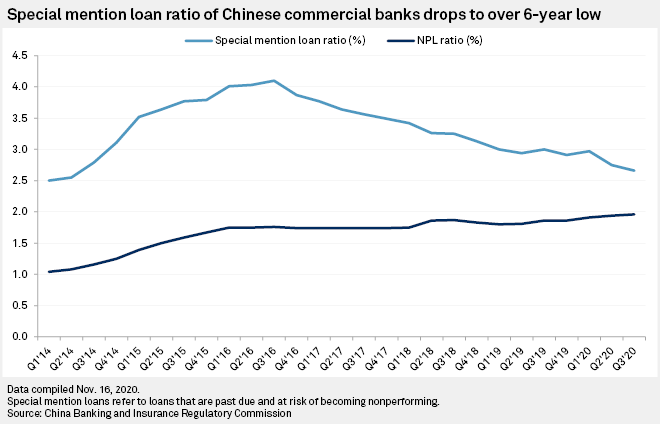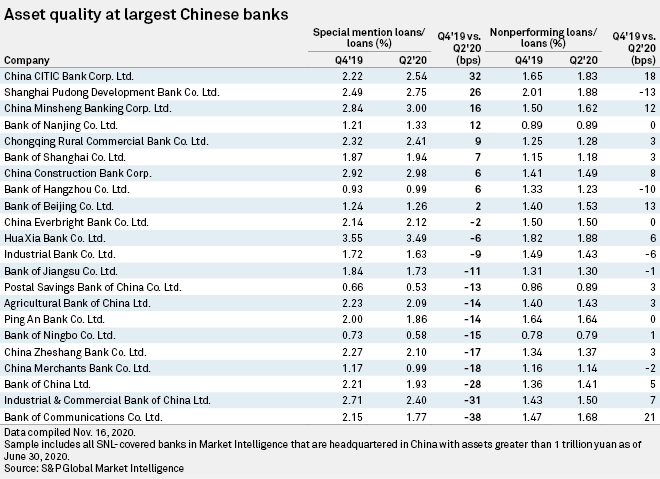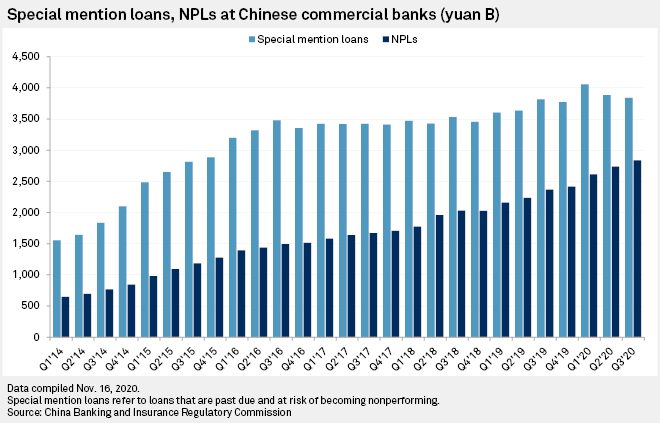Chinese banks are likely to classify more risky loans as nonperforming while writing more bad debts off their books in the fourth quarter, as they heed the government's call to clean up their balance sheet in order to increase lending to the pandemic-hit economy, analysts say.
In the three months ended Sept. 30, the special mention loan ratio at Chinese commercial banks dropped to an approximately six-year low of 2.66%, while the nonperforming loan ratio rose to 1.96%, the highest level in at least six years, data from China Banking and Insurance Regulatory Commission shows. In China, loans are classified as special mention when they are deemed at risk of becoming nonperforming.
During the first nine months of 2020, 1.73 trillion yuan of NPLs were written off Chinese banks' balance sheet, mostly through selling to third-party distressed debt managers, CBIRC data show. The lenders disposed of 2 trillion yuan of NPLs in 2019.
"A higher proportion of special mention loans are being recorded as NPLs, while at the same time, an increasingly larger portion of NPLs are being written off," said Michael Chang, director of Hong Kong and China financials at CGS-CIMB Securities. "This is due to the CBIRC and the [People's Bank of China] wanting the banks to accelerate the recognition of NPLs, and then subsequently writing these NPLs off."

Policy-driven lending
By pushing banks to move troubled loans more quickly from the special mention category to off-balance-sheet, lenders are able to conserve capital as firepower to increase lending without significantly hiking their credit costs. This policy also helps lower lending rates for less creditworthy borrowers, so that they won't be forced to turn to shadow banks for funding, which happened in previous economic slowdown and resulted in overleveraging and thus, systemic risk.
The regulator stated earlier Chinese banks collectively should aim at writing 3.4 trillion yuan of NPLs off their books this year. "We think that in [the fourth quarter], Chinese commercial banks will continue to see pressure from NPL disposal of around 1.67 trillion yuan," said Bruce Pang, head of macro and strategy research at China Renaissance.
China's formal banking system has been the primary source of funding for the economy throughout the pandemic. Total outstanding yuan loans at Chinese financial institutions rose 12.97% to 169.37 trillion yuan from the prior year, according to data from the People's Bank of China.
Analysts expect the gap between ratios of special mention loans and NPLs to narrow further as banks will likely continue their lending practices to support economic activities.
"We do expect the gap between the two to further narrow until mid-2021, as the regulators are still focused on ensuring that credit risks are brought out into the open within the banking system, while at the same time ensuring that the banks have a sufficient buffer of provisions against their loan portfolio," CGS-CIMB's Chang said.
Asset quality
In recent weeks, China's onshore bond market has also been rocked by loan defaults by several sizable issuers that have links to the state, such as Tsinghua Unigroup Co. Ltd., Brilliance China Automotive Holdings Ltd., Yongcheng Coal & Electricity Co Ltd.
Even so, analysts do not expect these failed bond payments to heavily impact the bank loan market for now.
Iris Pang, chief economist Greater China at ING Bank, noted that even though bonds and banks' loan quality are "somehow related in general," the health of commercial lenders still needs to be looked at individually.
"There could be more write-offs. And this could be a policy intent from the government," she said. "It is also a market behavior to write off bad debts to release capital for new loans. The government may be just allowing banks to follow market behavior."
CGS-CIMB's Chang said the corporate bond default rate still remains at 0.3% to 0.5%, providing little read to the overall corporate loan market. Overall, asset quality metrics reported by the listed banks "have been more benign than originally expected," he said, expecting no material change in the near term.
"Given the size of China, there definitely will continue to be news of some corporate defaults," he said. "But as a percentage of the entire corporate loan portfolio, given the [state-owned enterprise] nature of a sizable portion of the banking system, the loan quota system, policymaker's focus on social stability, and the willingness of the PBOC to consistently step in if credit markets are under stress, it is hard to expect any sizable increase in corporate defaults."

Easing to persist
As China is reeling from the pandemic, analysts expect the government to continue encouraging banks to issue more loans until the economy normalizes, which means that banks will continue to have to set aside funds for more bad loans despite accelerated efforts to dispose of nonperforming assets.
In addition to the NPL write-offs, China's State Council have called on banks to give up 1.5 trillion yuan, or 75% of their 2019 profits, to offer lower lending rates, slash fees, defer loan repayments and grant more unsecured loans to small businesses to help them recover from the coronavirus outbreak.
"We expect accommodative and targeted monetary policies to continue, focusing on injecting liquidity into the real economy, manufacturing sector, private firms and SMEs," China Renaissance's Pang said.
"As the economy recovers steadily, the argument of normalization has been raised by Yi Gang [China's central bank governor] and other senior officials recently. We do not expect China to have a sharp turn towards normalization in the near term, but balance between stabilizing growth and preventing risks or capping debt level."

As of Nov. 24, US$1 was equivalent to 6.59 Chinese yuan.



